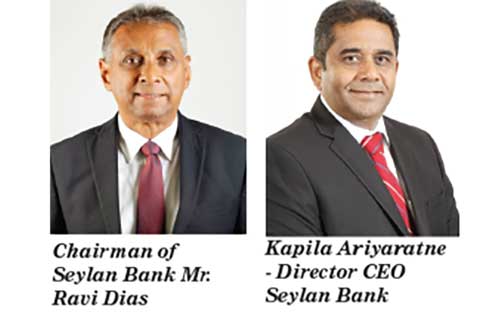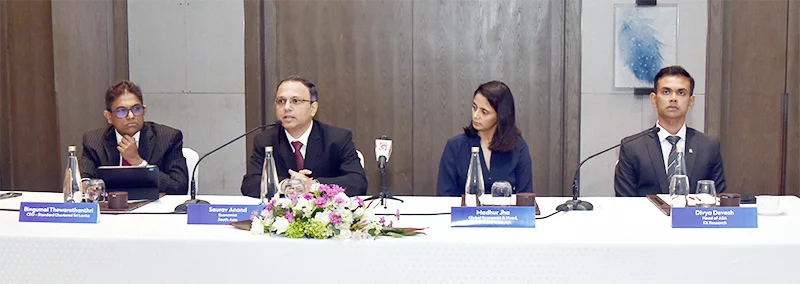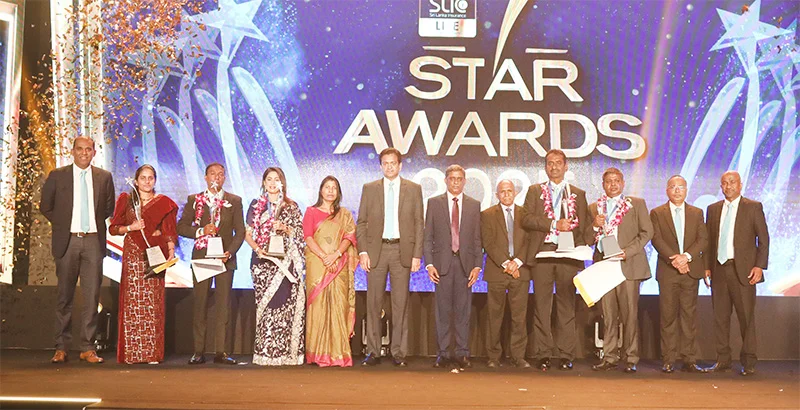Business
Seylan Bank records Rs. 1Bn PAT in 2021 Q1 despite Covid challenges

Financial Performance review for the 03 Months ended 31 March 2021
Seylan Bank made a steady start in 2021 by posting a Profit After Tax (PAT) of LKR 1Bn in Q1 2021 amidst macro-economic challenges brought in by the COVID-19 pandemic.
Statement of Financial Performances
Interest income recorded a decline due to the lower interest rates and moderate book growth but net interest margin showed a marginal increase over the corresponding period in 2020 due to lower financing costs.
Net Fee & Commission Income increased marginally to LKR 1.2Bn from LKR 1.0Bn, recording a YoY growth of 17.41% due to enhanced trade and guarantee volumes compared to the previous year.
The Total Operating Income growth of 22.25% predominantly driven by Net gains reported from de-recognition of financial assets which increased to LKR 185.2Mn from LKR 69.6Mn in 1Q 2020 and the other operating income increased by LKR 858.8Mn mainly due to increase in exchange income. On the flip side, trading activities reported a loss of LKR 611.4Mn mainly due to mark to market loss on derivatives which contracted the operating income YoY growth.
Bank recorded an impairment charge of LKR 2.2Bn during the period under review against LKR 1.1Bn reported in 1Q 2020 with a growth of 94.53% attributed to aggressive provisioning policy adopted.
Total Operating Expenses recorded LKR 3.4Bn in 1Q 2021 compared to LKR 3.3Bn in 1Q 2020. The Bank continued to focus on widening the roll-out of lean initiatives and automation across the Bank and rationalising expenditure on key controllable cost lines.
Overall, Bank recorded a Profit Before Tax (PBT) of LKR 1.4Bn against LKR 1.3Bn in 1Q 2020. Similarly, Profit After Tax (PAT) was recorded as LKR 1.0Bn against LKR 0.9Bn reported in 1Q 2020.
Statement of Financial Position
Bank achieved the LKR 562.7Bn Total Assets as of 31 March 2021, resulting 0.90% growth compared to the 31 December 2020.
Loans and advances portfolio of the Bank recorded a marginal growth of 1.51% to LKR 399.7Bn during the 1Q 2021 amidst of challenges faced. The growth in credit was driven primarily by Term Loans, and retail products such as Leasing, Pawning etc.
NPL ratio improved marginally to 6.39% against 6.43% reported as at last year end. Bank is continuously monitoring and strengthening the recovery process in order to bring under control and minimize the impact of the NPL.
The overall deposit base recorded a marginal growth of 1.28% to LKR 445.9Bn by 1Q 2021 compared to LKR 440.3Bn. Bank’s CASA ratio (Current and Savings) stood 34.52%.
Key financial ratios and indicators
Seylan Bank remained soundly capitalised, with the key capital adequacy ratios well above the regulatory minimum requirements and recorded 11.02% as the Bank’s Common Equity Tier 1 (CET 1) Capital Ratio/Total Tier 1 Capital Ratio and 13.59% as the Total Capital Ratio.
Bank maintained its liquidity position above the required minimum ratios, during the quarter under review. The Statutory Liquid Asset Ratio (SLAR) for the Domestic Banking Unit and the Foreign Banking Unit were maintained at 29.84% and 22.80% respectively as at end of first quarter 2021.
The Return on Equity (ROE) stood at 8.20% for the period under review, compared to 6.43% recorded in 2020. The Return (before tax) on Average Assets (ROAA) recorded as 1.00% in 1Q 2021.
Earnings per Share (EPS) in 2021 stood at LKR 1.88, a slight increase compared to the LKR 1.69 recorded in the comparative year, while net assets value per ordinary share recorded at LKR 91.92 (group LKR 95.23).
Successful and oversubscribed Debenture issue of LKR 6.0Bn endorsed and demonstrated the confidence placed in the Bank by the investors.
Business
Renowned Indian economist questions why Sri Lanka’s early social gains haven’t fueled lasting growth

Celebrated Indian economist Dr. Arvind Subramanian urged Sri Lanka to look beyond its current economic stabilisation, warning that the nation’s early human capital gains have historically lagged to translate into long-term, resilient growth.
Delivering a thought-provoking lecture at the Central Bank of Sri Lanka last week, the former Chief Economic Advisor to the Government of India placed human capital at the centre of Sri Lanka’s economic performance and what he described as puzzles – for which he knew no answers.
While acknowledging talks of regained stability and a growth shift here in Sri Lanka, Dr. Subramanian cautioned strongly against complacency. “Do not take stability for granted,” he emphasised, noting that macroeconomic stability has been very elusive in Sri Lanka’s past and that the recent crisis severely eroded living standards for ordinary citizens.
Quoting Austrian economist Joseph Schumpeter, he remarked: “The spirit of the people, its cultural level, its social structure… everything is written in fiscal history.” A country’s tax and expenditure patterns, he stressed, reveal deep truths about its societal and economic priorities.
Drawing a sharp contrast with India, he observed that while Sri Lanka achieved impressive early advances in health and education through deliberate state policy, India’s human capital improvements came largely after economic growth.
“In India, significant improvements in human capital indicators came after and because of economic growth. It happened despite society and despite the state, largely due to economic growth. Then growth boosted state resources for education and prompted families to invest in education spurring the rise of private institutions,” he explained.
“In contrast, Sri Lanka’s human capital space was characterised by early state-led achievements in health and education, preceding significant economic growth – a path that has not yielded the expected growth dividend,” he pointed out.
His analysis showed that Sri Lanka had a pressing intellectual and policy challenge:
In essence, it asked, why has Sri Lanka’s historical investments in people not driven more robust and sustained economic progress? And what must change in the country’s fiscal and economic strategy to turn its human potential into a true engine of secure and shared prosperity?
The lecture served as both a warning against complacency and an invitation to re-examine the fragile links between fiscal policy, human capital, and long-term economic destiny. For a nation on a fragile path to recovery, what he meant was: “Lasting stability must be built on tangible gains from its people’s capabilities.”
Despite Sri Lanka’s justifiable pride in its skilled workforce and social achievements, Dr. Subramanian’s insights revealed a different reality – one that calls for reflection and renewed strategy from the country’s policymakers.
However, a notable gap in the analysis was the absence of a contrast regarding Sri Lanka’s social fabric. While Dr. Subramanian powerfully quoted Schumpeter – that a nation’s spirit and social structure are written in its fiscal history, – he did not apply this lens to compare the cultural values and social structures of Sri Lanka and India, factors that may be critical to understanding the very paradox he outlined.
By Sanath Nanayakkare
Business
Standard Chartered: Sri Lanka’s 2026 economy bolstered by political stability

As Sri Lanka moves further away from its economic crisis, bolstered by an expected period of sustained political stability, the economic conditions are shifting from recovery to long-term stability, experts said at the Global Research Briefing hosted by Standard Chartered Bank in Colombo.
Calling a discussion with the financial press on 20th January, they outlined an outlook for Sri Lanka in 2026 that balances optimism with a necessary cautious view of the challenges ahead.
A primary point of discussion was the stance of the Central Bank of Sri Lanka (CBSL). Analysts believe the CBSL will maintain a cautious outlook throughout 2026. This vigilance is largely driven by sustained private-sector credit growth, which is currently trending above 20%. While such growth often signals a reviving economy, it carries the risk of an adverse impact on external-sector stability. Specifically, a surge in credit could fuel a spike in consumption imports, potentially straining the country’s hard-earned reserves.
The researchers’ report highlights that Sri Lanka’s 2026 outlook is significantly bolstered by political stability and policy continuity. Following the 2024 parliamentary elections, where the president’s party secured a more than two-thirds majority, the legislative path for continued reforms appears clear. Although provincial elections are anticipated in the first half of 2026, researchers suggest these are unlikely to derail the current policy trajectory, providing a predictable environment for both domestic and foreign investors.
In the foreign exchange markets, a gradual depreciation of the Sri Lankan Rupee (LKR) against the US Dollar (USD) is expected as the year progresses. Standard Chartered has maintained its USD-LKR forecasts at 309 for mid-2026, reaching 315 by the end of the year.
This shift is closely linked to the narrowing of the current account (C/A) surplus. While the C/A is expected to remain in positive territory, it is projected to narrow to approximately 1% of GDP in 2026, down from an estimated 1.8% in 2025. This narrowing is a byproduct of a strong growth recovery which naturally drives up demand for both consumption and investment-related imports. However, this pressure will be partially mitigated by a decline in car imports, they believe.
They further note that:
Despite the narrowing surplus, two critical pillars of the Sri Lankan economy – tourism and remittances – remain robust. Tourism is forecasted to grow by 5-10% in 2026, continuing its role as a vital supporter of the current account. Similarly, worker remittances are expected to stay strong, even as growth rates moderate from the high 20% levels seen in 2025.
In summary, the consensus from the briefing was clear: ‘Stay the course on reforms because that’s the essential ‘brick by brick’ strategy required to ensure the sustainability of Sri Lanka’s economic future.
By Sanath Nanayakkare
Business
SLIC Life recognises its top sales personnel

Sri Lanka Insurance Life celebrated its top sales performers at the Star Awards 2025 gala held at Cinnamon Life, Colombo. Under the theme “Rise of the Legends,” the event honored over 300 high achievers for their exceptional 2024 performance.
The awards recognized excellence across categories, including top Insurance Advisors, Branch Managers, and Bancassurance professionals. Key winners included All Island Best Regional Manager P. Sathiyan and All Island Best Advisor K.G.A.S.L. Weerasinghe.
Chairman Nusith Kumaratunga, CEO Nalin Subasinghe, and the corporate management joined over 350 attendees to celebrate the achievers. The evening reinforced the company’s culture of excellence as it strives to be the nation’s leading life insurer.
-

 Business21 hours ago
Business21 hours agoComBank, UnionPay launch SplendorPlus Card for travelers to China
-

 Business2 days ago
Business2 days agoComBank advances ForwardTogether agenda with event on sustainable business transformation
-

 Opinion7 days ago
Opinion7 days agoAmerican rulers’ hatred for Venezuela and its leaders
-

 Opinion5 days ago
Opinion5 days agoRemembering Cedric, who helped neutralise LTTE terrorism
-

 Business5 days ago
Business5 days agoCORALL Conservation Trust Fund – a historic first for SL
-

 Opinion4 days ago
Opinion4 days agoA puppet show?
-

 Opinion2 days ago
Opinion2 days agoConference “Microfinance and Credit Regulatory Authority Bill: Neither Here, Nor There”
-

 Opinion7 days ago
Opinion7 days agoHistory of St. Sebastian’s National Shrine Kandana













